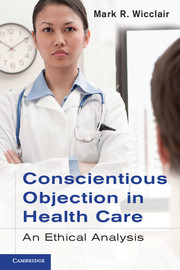Book contents
- Frontmatter
- Contents
- Preface
- 1 Introduction
- 2 Three approaches to conscientious objection in health care: conscience absolutism, the incompatibility thesis, and compromise
- 3 Ethical limitations on the exercise of conscience
- 4 Pharmacies, health care institutions, and conscientious objection
- 5 Students, residents, and conscience-based exemptions
- 6 Conscience clauses: too much and too little protection
- References
- Index
4 - Pharmacies, health care institutions, and conscientious objection
Published online by Cambridge University Press: 05 June 2012
- Frontmatter
- Contents
- Preface
- 1 Introduction
- 2 Three approaches to conscientious objection in health care: conscience absolutism, the incompatibility thesis, and compromise
- 3 Ethical limitations on the exercise of conscience
- 4 Pharmacies, health care institutions, and conscientious objection
- 5 Students, residents, and conscience-based exemptions
- 6 Conscience clauses: too much and too little protection
- References
- Index
Summary
The focus of previous chapters has been on conscience-based refusals by individual physicians, nurses, and pharmacists. This chapter will consider conscientious objection in relation to pharmacies and health care institutions. Even if it is acknowledged that it is appropriate to accommodate individual pharmacists with conscience-based objections to dispensing a medication when the constraints and requirements proposed in Chapter 3 are satisfied, it remains to consider whether pharmacies may justifiably refuse to stock and dispense a medication for reasons of conscience. Similarly, even if it is acknowledged that it is appropriate to accommodate conscience-based objections of individual physicians, nurses, and pharmacists who practice in health care institutions (e.g. hospitals and nursing homes) when those constraints and requirements are satisfied, it remains to consider whether institutions may justifiably refuse to provide a service for reasons of conscience.
PHARMACIES
Dispensing obligations of pharmacy licensees
Pharmacies are licensed by states, are granted a monopoly to dispense medications that require prescriptions, and are subject to regulation. State boards of pharmacy confer licenses to operate pharmacies with the justified expectation that they will promote specified ends – typically, the public health, safety, and welfare. These are the ends identified in a Model State Pharmacy Act. The Model Act's “Legislative Declaration” (Section 102) includes the following statement: “The Practice of Pharmacy in the State of__is declared a professional practice affecting the public health, safety, and welfare and is subject to regulation and control in the public interest.”
- Type
- Chapter
- Information
- Conscientious Objection in Health CareAn Ethical Analysis, pp. 135 - 167Publisher: Cambridge University PressPrint publication year: 2011



